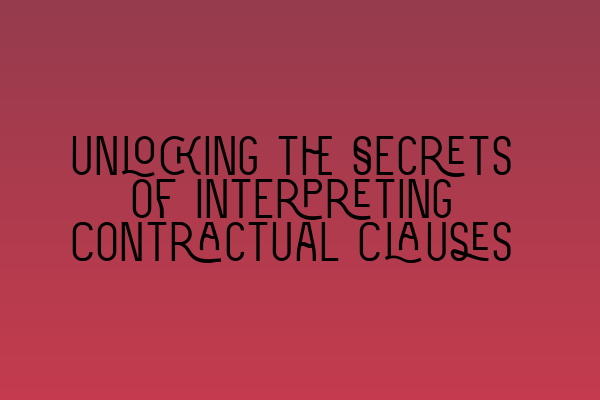Unlocking the Secrets of Interpreting Contractual Clauses
Contracts are the lifeblood of modern business transactions. They establish the rights and obligations of parties involved and provide a framework for resolving disputes. However, understanding the true meaning and intent of contractual clauses can be a complex and challenging task. In this article, we will unlock the secrets of interpreting contractual clauses, providing you with the knowledge and tools to navigate the intricacies of contract law.
1. Context is Key
When interpreting contractual clauses, it is essential to consider the context in which they are written. This includes examining the entire agreement, as well as any relevant background information or negotiations that took place. By understanding the broader context, you can gain insights into the parties’ intentions and the purpose of specific provisions.
For example, imagine you are interpreting a contract that includes a non-compete clause. Referring back to earlier discussions or correspondence related to the non-compete provision can shed light on its intended scope and duration. By considering the context, you can ensure a more accurate interpretation.
2. Define Ambiguous Terms
Contracts often contain ambiguous terms, which can lead to confusion and disputes. To avoid such issues, it is crucial to define ambiguous terms within the contract itself or reference external sources such as industry standards or legal definitions.
Suppose you encounter ambiguous language like “reasonable time” in a contract. In that case, you should consult legal authorities or relevant precedents to determine its meaning within the context of the agreement. By precisely defining ambiguous terms, you can eliminate uncertainty and provide clarity to the parties involved.
3. Consider the Ordinary Meaning
When interpreting contractual clauses, it is generally presumed that words and phrases should be given their ordinary meaning. The ordinary meaning is the interpretation that a reasonable person would attach to the language in question.
However, sometimes contract drafters include technical jargon or terms of art specific to a particular industry. In such cases, the ordinary meaning may not apply, and it becomes necessary to consider the intended meaning within the relevant industry or professional context.
4. Pay Attention to Grammar and Punctuation
Grammar and punctuation play a vital role in interpreting contractual clauses. The placement of commas, semicolons, or other punctuation marks can significantly affect the meaning of a sentence.
Consider the following example:
“The Company agrees to pay the Consultant $100,000 in monthly installments.”
Now, let’s change the punctuation:
“The Company agrees to pay, the Consultant $100,000 in monthly installments.”
The placement of the comma completely changes the meaning of the sentence. Such subtle nuances can have substantial implications on the interpretation of contractual clauses. Therefore, careful attention must be paid to grammar and punctuation when interpreting contracts.
5. Seek Professional Guidance
Interpreting contractual clauses is a complex and nuanced process that requires a deep understanding of contract law principles and legal precedents. If you are unsure about the correct interpretation of a contractual clause, it is always recommended to seek professional guidance from experienced solicitors.
Professional solicitors who specialize in contract law can provide valuable insights and guidance, helping you navigate the intricacies of contractual interpretation. They can analyze the language, consider the context, and provide a comprehensive interpretation that aligns with legal principles and current case law.
Related Articles:
